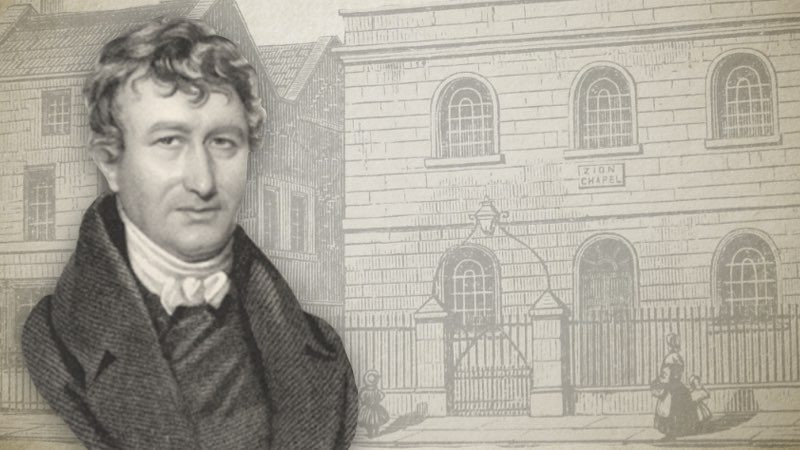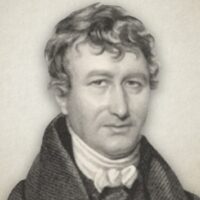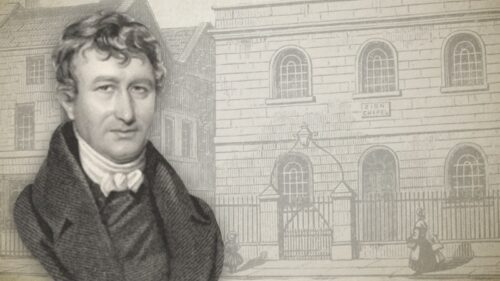
The Life And Ministry Of John Warburton
Gospel Magazine 1840
Within the pages of the Gospel Magazine have already appeared the names of men of loftiest human intellect and attainments, as well as of a high standard in their vindication of the doctrines of the full and free distinguishing and unmerited grace of our Triune Jehovah. But the subject of our present sketch is quite another order of being; instead of his being enabled to trace the origin of his present position of usefulness, more particularly among the tried and dejected of the Lord’s family, to a respectable birth and a good education, we see Him who has said, “He giveh not account of any of his matters,” going forth in his divine sovereignty, and calling into his vineyard and his service, a poor illiterate weaver, compelled to earn his scanty pittance by the sweat of his brow; whom having called, he instructs in the school of temptation, affliction, and sorrow, and thus qualifies him a fit messenger to go forth and testify to the church of the providential goodness, superabounding grace, and unchangeable love of our eternal God.
There was a period when such a selection or choice on the part of the Almighty would have aroused all the bitterness and enmity of which the human heart is capable, among the majority of those whose supposed ministerial qualifications are nurtured at Oxford and Cambridge; but now-a-days that enmity is far extended, and displays itself with equal virulence among those who are tutored at our Dissenting colleges. These are now quite as ready as the former to reiterate the question, “Can any good thing come out of Nazareth?”, but we stay not to particularize the lengths to which some men of this class will go, nor to comment upon the contempt and spleen which they display towards those despised individuals whom God sometimes makes the trophies of his grace, and occasionally selects as the witnesses for his truth.
We love to see a minister possessed of human learning, where that learning is seasoned by grace; we are sensible that from the colleges of Oxford and Cambridge have emanated men who have boldly and unflinchingly declared the truth as it is Jesus, and who now, having delivered their message—finished the work given them to do, are gone to their rest; and we rejoice that there are still men of this description with whom our souls are in intimate communion—whom we have never yet seen in the flesh, nor perhaps ever shall see, but whom we are expecting to meet in a world where all discord, strife, and division, shall for ever he done away. We believe likewise that many good and gracious men have received some of their earlier instruction in Dissenting colleges; but we lament to say, that some have we known amid the limited sphere of our acquaintance, whom once we had reason to think well of; in whose hearts a work of grace appeared to have been begun; and who bade fare to run well; but who now, alas! have imbibed so much of the principles and practices of the day in which we live, and by which they are so greatly surrounded, that we look in vain for that simplicity, teachableness, and fervour, which formerly characterised them, and so highly raised them in our esteem. But, while we recollect a company of poor fishermen as our Lord’s disciples and more immediate companions, and think of a tinker, a coalheaver, and others of equally low pedigree, we do repudiate that spirit of satire, opposition, and disgust which dares to sit in judgment upon the sovereign acts and discriminating choice of our most gracious God. Reader, if thou shouldst be among them, we warn thee: turn to thy Bible—read over and meditate upon the 1st chap. Cor. 24th to 29th verses. “For ye see your calling, brethren, how that not many wise men after the flesh, not many mighty, not many noble, are called; but God hath chosen the foolish things of the world to confound the wise; and God hath chosen the weak things of the world to confound the things which are mighty; and base things of the world, and things which are despised, hath God chosen, yea, and things which are not to bring to nought things that are: that no flesh should glory in his presence.”
Mr. Warburton has now, if we remember rightly, been in the ministry about thirty years; the greater portion of which he has laboured over a church at Trowbridge, in Wiltshire; and we have heard, from indirect and undoubted sources, that his church is “knit together in love.” We could have furnished our readers with many deeply interesting anecdotes in connexion with him—more particularly the singularity of his call to Trowbridge; but we forbear, as Mr. Warburton has published his own account at a very limited price, and as we have a great aversion to copy from other men’s writings.
John Warburton (1776-1857) was a Strict and Particular Baptist preacher. He was appointed the pastor of Zion, Trowbridge, where he labored in the gospel among the Lord’s people for forty-two years. John Hazelton wrote of him:
“John Warburton (1776-1857) was a link between two generations, for in the early years of his ministry he was encouraged by William Huntington and afterwards became the friend of Joseph Charles Philpot, whom he baptized at Allington in 1835. Of him Mr. Philpot says: "I have heard Mr. Gadsby preach as great, perhaps greater sermons, but I never met with a minister whose prayer in the pulpit, or whose conversation out of it, was so weighty. Hundreds, perhaps thousands, have borne witness to the power and savour which rested upon his testimony; but the blessing he has been made to the Church of God will never be fully known until the day when the secrets of all hearts shall be revealed." Rochdale and Trowbridge were the places of his pastorates, and by his book, "Mercies of a Covenant God," his memory will long be cherished by the family of faith. His account of his interview with Huntington casts light upon the character of these two men of God and gives us a glimpse of the latter in his study in his house at Hermes Hill, Pentonville: "The good old man was sitting at his table with his cap on, and his Bible open before him, and he looked just like the Prophet Elijah in my eyes. But I was so shaken that I could hardly tell what to stammer out, nor did I know for a few moments what to say. At last, however, I said I had read his book, 'The Kingdom of Heaven taken by Prayer,' many years ago, and it had been made a great blessing to my soul then, as it had been ever since at times, and that I had made a vow that if ever I came anywhere near where he was I would tell him of it. But the dear old man never spoke a word, nor lifted up his head. At last I said, 'It is a mercy that we are poor sinners!' He replied, 'There are many poor sinners that know nothing of the matter.' Warburton then began to speak of the work of God the Holy Ghost in the heart. Huntington looked up and said, 'What dost thou know of the love of God? What is it? And what are the effects of it when known and felt in the soul?' Then I told him what God had done for me. He looked up with tears running down his cheeks and blessed God for what He had taught me; and I believe he brought twenty portions of God's Word to prove that it was the teaching of the blessed Spirit of God; and we both wept together. He opened his table-drawer and scraped up all the silver he had in it and poured it into my hands, and said 'I give you this for your family.' With great cordiality he shook me by the hand and uttered words which have been a source of many comfortable moments to me since, when I have been sinking almost into despair. The words were these: 'May the Lord God of Abraham, of Isaac, and of Jacob, bless thee and go with thee.'"
John Warburton's last moments bore testimony to the blessing invoked. The dying saint wished to say something; he was asked, "Is it to tell how good the Lord is to you in your last moments?" He lifted up both hands, and waving them with peculiar delight, said "Yes, yes." He still continued to appear as if those around him did not sufficiently understand him. With great exertion he lifted up both hands, pointing with his finger and labouring to articulate something. At last he said, "Hal—Hal—!" Then followed with a firm voice, without a waver, "Hallelujah!" and he immediately breathed out his soul. "Mark the perfect man, and behold the upright; for the end of that man is peace."
His son, who became pastor of the church at Southill, Beds, was in his early days very wayward, and enlisted in the army. Dear old Mr. Warburton followed him from place to place with prayers and tears, and at last wrote to Arthur Triggs (1787-1859), who was then at Plymouth—afterwards at Zion Chapel, Waterloo Road, and Gower Street Chapel—asking him to see his boy. He willingly undertook this task, and with the utmost kindness and consideration wrought for the welfare of the lad. His father wrote: "O the kindness, the love, and feeling, that my dear brother Triggs manifested to one so unworthy! It knit my soul to him in a moment, and we were one spirit. Scores of times has my soul begged the best of blessings to rest upon him and his. The poor prodigal returned home, and a hearty welcome he had, and I soon found the work was of God." Here were two good men often libelled as "hard" and "narrow," deeply stirred by concern for this poor wanderer, and in this, as throughout their lives, tender and patient in their dealings with such as he. Every doctrine of grace applied to the heart by the Holy Spirit melts and softens, sanctifies and solemnises, banishes levity, and gives depth, weight, and power to testimony. Father and son never wavered from the truth, were never carried about with divers and strange doctrines, and never speculated or reasoned beyond what they knew and felt for themselves.”




